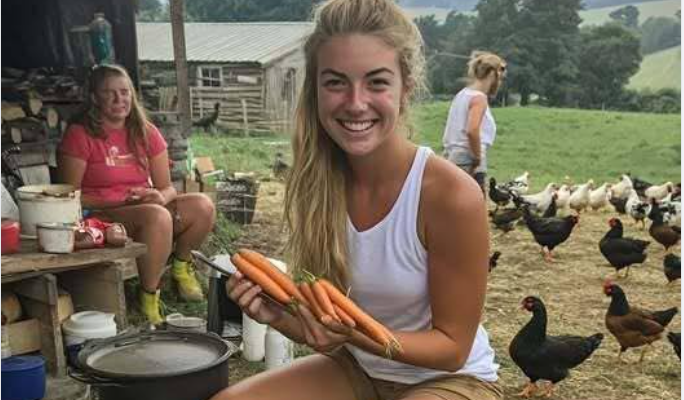I grew up on a sweet potato farm ten miles outside town, where mornings began before the sun rose and “vacation” meant the county fair — if the harvest allowed. The smell of damp earth and coffee was my alarm clock, and my parents moved with the steady purpose of people who built their lives acre by acre. By the time my classmates in town were brushing sleep from their eyes, I’d already helped sort potatoes or wrangle stubborn chickens back into the coop.
Our life was simple, hands-on, and full of quiet pride. My parents didn’t talk much about success — they showed it, in worn boots, honest sweat, and full crates hauled to the Saturday market. I learned early how to patch a flat tire, track the weather like a sixth sense, and balance the books after selling produce at our roadside stand.
So when I earned a scholarship to a private high school in the city, it felt like the door to a new world had opened. My family was overjoyed — they believed in me more than I believed in myself. I remember walking into that school on the first day in jeans still faintly smelling of the barn, my hands rough from weekend chores. I hadn’t expected a red carpet, but I also hadn’t expected judgment.
“Ew. Do you live on a farm or something?” someone whispered just loud enough for me to hear. Laughter followed. The comments kept coming — about my shoes, my ancient flip phone, my lack of Wi-Fi at home, even tractors. I became hyper-aware of everything — the mud on my soles, the way I said “y’all,” even the lunch I brought in a reused jam jar.
So I shrank myself. I stopped talking about home. I scrubbed the soil from under my nails like I was trying to erase it. At school, I became quiet and careful. But back home, I was still Mele — the girl who could lift a fifty-pound sack without blinking, who knew which row needed more compost just by looking at the leaves. At home, I was useful. Respected.
The turning point came unexpectedly. Our school was hosting a fundraiser for a new arts building, and students were encouraged to contribute homemade goods. Most brought cookies, brownies, or crafts. I wasn’t sure I even belonged in that kind of setting — but my mom nudged me. “Why don’t you bake something?” she said. “Make it yours.”
So I did. I baked six sweet potato pies using our family’s recipe — the same ones that always sold out at the farmers’ market. They were warm, spiced just right, and filled with the flavor of home. I brought them in with zero expectations.
They sold out in twenty minutes.
People were asking who made them. Teachers were asking if I took orders. Even Ms. Bell, the guidance counselor, pulled me aside and said, “This is you, Mele. This is something special.” Then Izan — the guy everyone liked, the kind of guy who was cool without trying — came over. “Think you could bake one for my mom’s birthday?”
That moment cracked something open in me. Maybe I didn’t have to keep my worlds separate. Maybe, just maybe, my roots weren’t baggage — they were a gift.
That weekend, I baked again. But this time, I brought more than a pie to school. I printed flyers on our old home printer: Mele’s Roots — farm-to-table sweet potato pies. I told our story in a few lines — how we grew everything ourselves, how it was more than food, it was family.
The response was overwhelming. Orders poured in. Teachers wanted them for staff meetings. Parents asked for bulk orders for holidays. One girl even tried trading her designer jacket for a pie. My parents were stunned — and proud. They started teaching me old baking tricks I never thought I’d care about, and I started using our farm in my schoolwork. In biology, I explained crop rotation using our fields. In English, I wrote essays about my parents’ grit.
People listened.
Even the glossy-ponytail girl — the one who made that comment on day one — came up to me one afternoon and asked for the recipe. I didn’t gloat. I just smiled. Quiet victory.
By senior year, for our final identity project, I created a short film about the farm — the sunrise over the fields, my parents working side-by-side, our community at the farmers’ market. When it played in the auditorium, the whole school clapped. Some stood. And Izan hugged me after. “Told you your story mattered,” he said.
He was right.
I used to think my roots were something to hide — too dirty, too rural, too different. Now I know they’re my power. They shaped me — grounded me. And no matter how far I go, I carry them with me. In flour-dusted hands. In quiet confidence. In every pie I bake.



